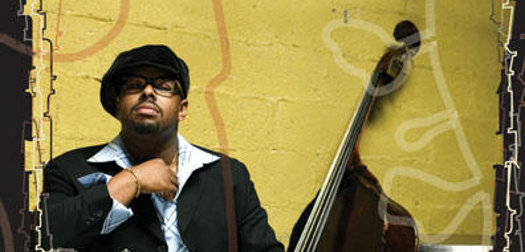Features
Conversation with Christian McBride
by Mike McKinley | photography by Michael DiDonna
April 2, 2006
Conversation with Christian McBride
by Mike McKinley | photography by Michael DiDonna
April 2, 2006
page 3 of 3
|
|
|
|
 |
||
|
|
|
MM: I guess it's kind of interesting as your own playing evolves‚ this is a guy you played with years ago. And you both have gone your own paths.
CM: Roy I think is two or three years older than me‚ but we both came to New York at the same time‚ roughly the same time. And we played together a lot the first few years in New York‚ and I was in his first touring band. And although we don't get the chance to play much anymore‚ we still feel each other. We keep an eye on each other's career. Joshua Redman is the same way. A lot of these guys‚ even though we don't play together‚ we still got a strong union. Because we're all a part of the same generation‚ so we'll always be together in that sense. I remember when I was in Freddie Hubbard's band‚ and you know‚ he would talk about Wayne Shorter or Herbie Hancock or McCoy Tyner or Elvin Jones like they were just regular guys. And I thought‚ well‚ to him‚ they are regular guys. They all came up together. It's like when I tell people that I grew up with ?uestlove. They're like‚ "Really?!" What's so impressive about that? And I'll start thinking‚ oh‚ yeah right‚ I forgot -- he's famous. [Laughter]
MM: Exactly! That's interesting. Are you starting to get that from these students and stuff like that?
CM: Uhh … Every now and then.
MM: Every now and then something surprises you?
CM: Yeah. "Wow‚ Christian McBride!" I'm like‚ no‚ believe me‚ don't believe the hype. [Laughter]
MM: It's interesting. You're talking about your generation. What do you think it is about it? It's all happening now‚ what do you call it?
CM: I don't know. I think we are truly kind of reassessing what jazz is and what it can be. We're the generation that's really keeping a close eye on stretching out as far as we can but still keeping a foot planted in the tradition. As opposed to a lot of musicians the generation before us kept both feet in the tradition. They said‚ "Okay look‚ we need to really restore jazz's original values to make sure people understand what this is." And those are the musicians‚ like the Wynton Marsalises and the Terrence Blanchards and the Mulgrew Millers‚ that really stuck to the real traditional‚ straight-ahead jazz‚ which was great‚ because that actually was sorely needed at that time. But then you have the so-called renegades: guys like Greg Osby and Steve Coleman‚ Mark Ledford‚ Andy Hill. You know‚ guys who owned what was known at that time as the MBase scene. They were the ones that were the early experimenters with computers and electronica and trying to put that into jazz. They were doing that in the mid-'80s. But I think the guys in our generation‚ we're splitting the difference. We'll see where it takes us.
related articles
Shows: Chick Corea‚ John McLaughlin - Five Peace Band
Magazine: State of Mind - February/March 2008
Albums: Ron Blake - Shayari
Albums: Bruce Hornsby - Camp Meeting
Magazine: State of Mind - April 2006
More on: Christian McBride
Shows: Chick Corea‚ John McLaughlin - Five Peace Band
Magazine: State of Mind - February/March 2008
Albums: Ron Blake - Shayari
Albums: Bruce Hornsby - Camp Meeting
Magazine: State of Mind - April 2006
More on: Christian McBride
new to state of mind
Shows: moe.
Shows: Yonder Mountain String Band
Shows: Grand Point North 2014
Shows: Catskill Chill 2014
Shows: moe.down 15
Shows: Gov't Mule
Shows: Umphrey's McGee
Shows: Newport Folk Festival 2014
Shows: Widespread Panic
Albums: Phish - Fuego
Shows: moe.
Shows: Yonder Mountain String Band
Shows: Grand Point North 2014
Shows: Catskill Chill 2014
Shows: moe.down 15
Shows: Gov't Mule
Shows: Umphrey's McGee
Shows: Newport Folk Festival 2014
Shows: Widespread Panic
Albums: Phish - Fuego
most popular
Blog: Radiohead: Adam King tries to convince me they are aliens…
Blog: New Video/Song From Dr. Dog - "Broken Heart"
Blog: Mountain Oasis welcomes NIN‚ Bassnectar and Pretty Lights
Blog: Mehliana Tour (Brad Mehldau + Mark Guiliana)
Blog: Video: Club d'Elf with Marco Benevento - "Bass Beatbox"
Blog: Reed Mathis and Victor Wooten Talk Bass
Features: Conversation with Kurt Rosenwinkel
Features: Conversation with Tommy Benedetti of John Brown's Body
Features: Conversation with Bill Kreutzmann
Shows: Rothbury 2009
Blog: Radiohead: Adam King tries to convince me they are aliens…
Blog: New Video/Song From Dr. Dog - "Broken Heart"
Blog: Mountain Oasis welcomes NIN‚ Bassnectar and Pretty Lights
Blog: Mehliana Tour (Brad Mehldau + Mark Guiliana)
Blog: Video: Club d'Elf with Marco Benevento - "Bass Beatbox"
Blog: Reed Mathis and Victor Wooten Talk Bass
Features: Conversation with Kurt Rosenwinkel
Features: Conversation with Tommy Benedetti of John Brown's Body
Features: Conversation with Bill Kreutzmann
Shows: Rothbury 2009
